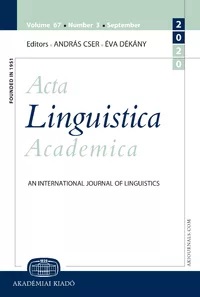Gender variation in indeclinable inanimate nouns and gender markedness in modern Russian
Gender variation in indeclinable inanimate nouns and gender markedness in modern Russian
Author(s): Kirill Chuprinko, Varvara Magomedova, Natalia SlioussarSubject(s): Morphology, Eastern Slavic Languages
Published by: Akadémiai Kiadó
Keywords: gender variation; Russian indeclinable nouns; default gender; loanwords; corpus study
Summary/Abstract: In this paper, the results of a large web-corpus study on gender of Russian inanimate indeclinable common nouns are presented. In most cases, neuter is assigned to indeclinables as a default. However, morphophonological and semantic analogy may lead to feminine and masculine gender assignment. An extensive variation is observed in the whole group of indeclinables and for particular words, which is much larger than anything that can be found in indeclinable nouns. These data support the idea that both masculine and neuter genders have a special status in the Russian gender system (Magomedova & Slioussar 2023). Masculine tends to be chosen in case of conflicting gender cues. When there are no strong cues pointing to any gender, neuter is assigned as the default option. The results of the study are hardly compatible with various structural approaches to gender assignment, but can be accounted for in competition-based models.
- Issue Year: 70/2023
- Issue No: 3
- Page Range: 317-338
- Page Count: 22
- Language: English
- Content File-PDF

